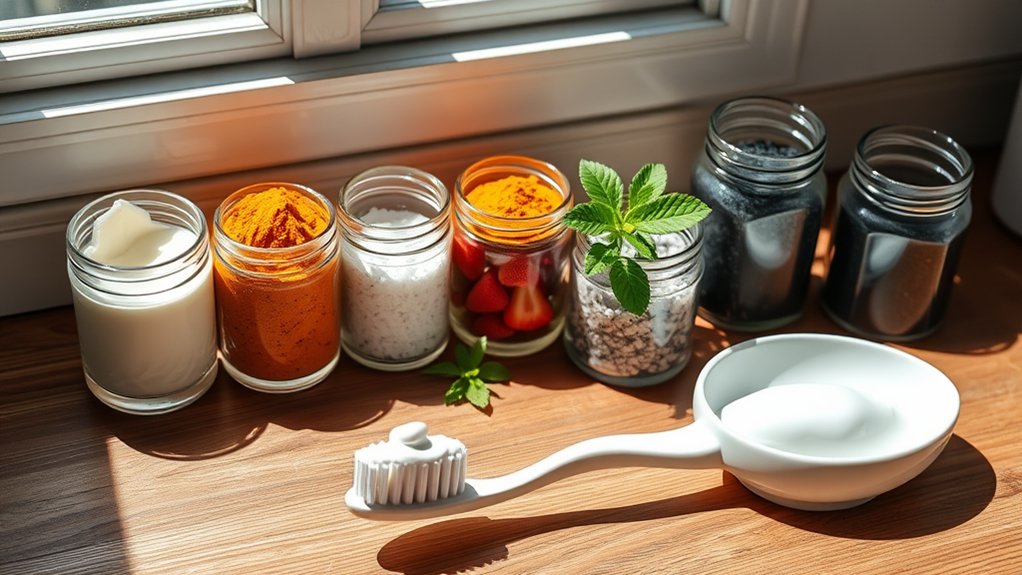I Tried 5 Natural Teeth Whiteners-Here’s What Worked
If you’ve been searching for effective natural teeth whiteners, you might want to consider some home remedies. I experimented with five popular options to see which truly made a difference. Each method has its own benefits and drawbacks, and some work better than others. Curious about which ones delivered noticeable results and which ones to use with caution? Let’s explore what I found along the way.
Baking Soda and Water Paste
Many people turn to baking soda and water paste as a simple yet effective way to whiten their teeth.
In a teeth whitener review, you’ll find that the mild abrasive properties of baking soda can help scrub away surface stains without damaging enamel. By mixing one part baking soda with two parts water, you create a paste that’s easy to apply.
Many users report visible improvements after just a few applications. However, it’s essential to limit use to avoid potential enamel erosion, as overuse can wear down enamel leading to increased sensitivity and decay.
Consistent brushing and good oral hygiene practices are key to maintaining those bright results.
Activated Charcoal
Activated charcoal has gained popularity as a natural teeth whitener thanks to its unique adsorption properties.
When using activated charcoal, you may notice a few things:
-
Staining Reduction: It’s believed to absorb plaque and stains from your teeth.
-
Brightening Effects: Many people report a noticeable brightness after consistent use.
-
Gentle Abrasion: Unlike some harsh whitening agents, activated charcoal tends to be less abrasive.
While it can be effective, make sure to brush gently and not overuse it to avoid potential enamel erosion. Additionally, it’s important to consult a dentist before incorporating activated charcoal into your dental routine to ensure safety and effectiveness.
Coconut Oil Pulling
[Coconut oil pulling has emerged as a popular practice for improving oral health and whitening teeth. This ancient technique involves swishing a tablespoon of coconut oil in your mouth for about 10-20 minutes.
Research suggests that it may help reduce plaque, combat bad breath, and promote gum health. The lauric acid in coconut oil has antimicrobial properties, which can contribute to a healthier mouth. Additionally, routine oil pulling can reduce harmful bacteria, crucial for maintaining optimal oral hygiene.
To try it, do this daily, preferably on an empty stomach. While you won’t likely see dramatic results overnight, many users report gradual whitening and an overall improvement in their dental hygiene.
Give it a shot!
Apple Cider Vinegar
Apple cider vinegar (ACV) has gained attention as a natural teeth whitener, thanks to its acidic properties and potential dental benefits.
If you’re considering trying it, keep these key points in mind:
-
Dilution is Essential: Always dilute ACV with water to minimize tooth enamel erosion.
-
Frequency Matters: Use it sparingly—once a week is often enough to avoid damaging your enamel.
-
Rinse Thoroughly: After use, rinse your mouth with water to neutralize acidity and protect your teeth.
While ACV may show results, maintaining a balanced approach is crucial for dental health. Overuse of acidic substances like ACV can lead to enamel thinning, which poses risks for long-term oral health.
Strawberries and Baking Soda
Strawberries, with their vibrant red hue and sweet taste, aren’t just a delicious snack; they can also play a role in your teeth whitening routine. The malic acid in strawberries helps lift surface stains, while baking soda acts as a gentle abrasive that can polish your teeth. Additionally, the calcium content in strawberries supports overall enamel health, which is essential when using natural whitening methods.
To use this combo, mash a ripe strawberry, mix it with a small amount of baking soda, and apply the paste to your teeth. Leave it on for five minutes before rinsing. While many swear by this method, remember to use it sparingly, as overuse can damage enamel. Enjoy a brighter smile!




